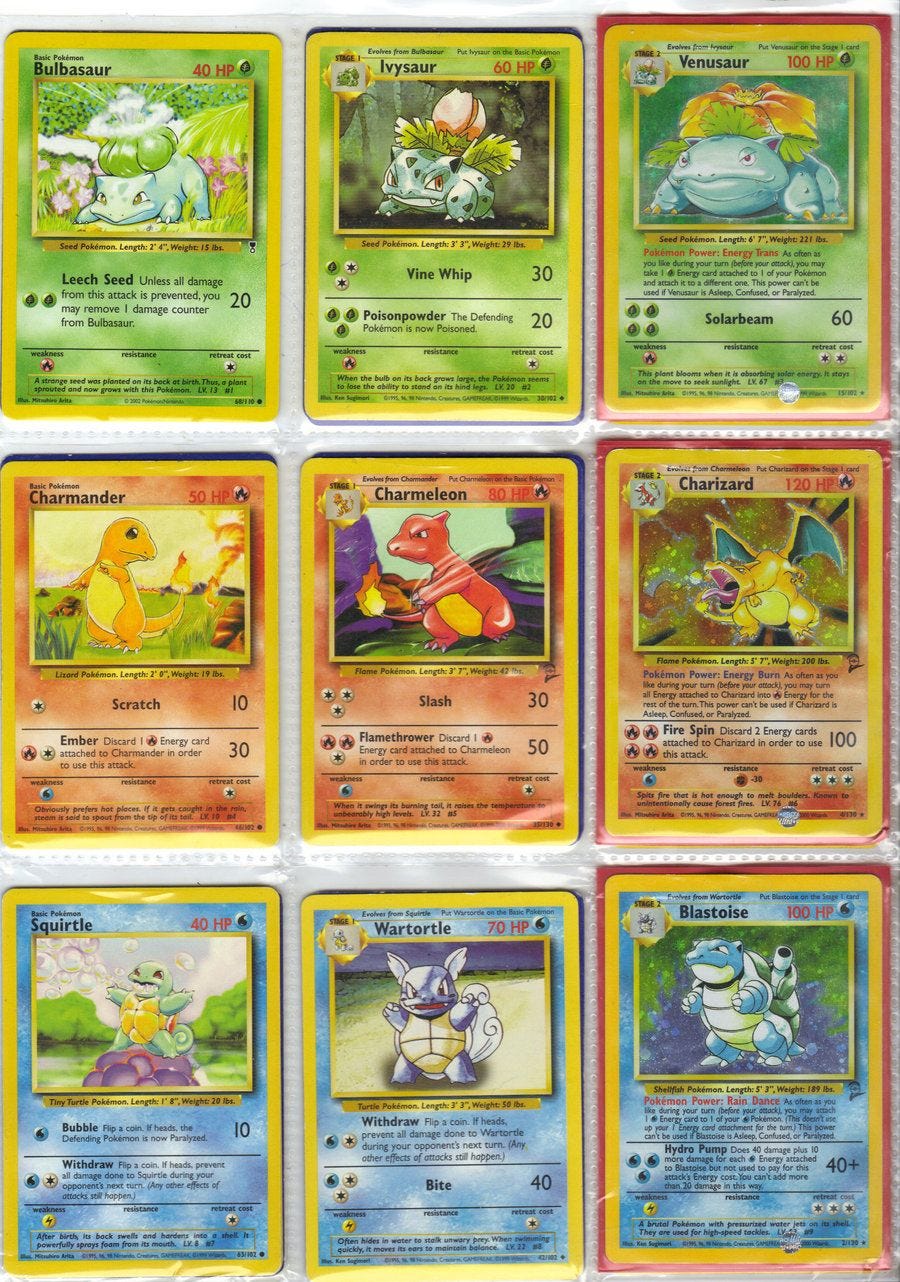Why Nostalgia Feels Good: The Science Behind Our Memories
About childhood memories, Pokémon cards, and the science of nostalgia.
🕰️ Reading time: 4 minutes
Yesterday I was messaging with one of my dearest friends, remembering the time we used to spend hours playing Pokémon videogames on our GameBoy, and exchanging Pokémon cards.
Yes, we loved Pokémon.
But who didn’t, if you were born in the early ’90s?
There’s something about Christmas that inspires these childhood memories.
Maybe it’s the soft glow of twinkling lights, or maybe it’s the way the world seems to slow down, inviting us to look back.
Whatever it is, that conversation left us both swimming happily in nostalgia.
We were so nostalgic that my friend, who usually keeps his messages short and sweet, sent me a six-minute Whatsapp audio, talking about his old Pokémon squad and the hours we spent at the park, hoping for the best card trades with the other kids.
Why does nostalgia feel so good, and why do we crave it so deeply?
First of all, definition:
Nostalgia is an affectionate feeling we have for the past, especially for a particularly happy time.
🔬 What science says
Scientists say feeling nostalgic often springs from remembering a positive childhood memory, a time when we were cared for.
Krystine Batcho - a psychology professor at LeMoyne College - says that consuming nostalgic media of all types can help us think about who we are, and helps us make sense of our purpose in life.
Let that sink in for a moment: feeling nostalgic “helps us making sense of our purpose in life”.
Professor Batcho has been studying nostalgia since the 1990s, even developing a Nostalgia Inventory in 1995 to assess how prone we are to nostalgia.
Similarly, professor Ziyan Yang explained that while experiencing nostalgia, we can feel a sense of warmness, fondness, and belonging, and even experience a sort of “mental time travel”.
These feelings can drive people to seek out nostalgic experiences.
Professor Yang says that movies and music easily trigger nostalgia, and that nostalgic experiences can be particularly comforting in difficult times (for example, during the COVID-19 pandemic we felt more nostalgic).
This happens because we generally find comfort in nostalgia during times of loss, anxiety, isolation, or uncertainty.
And surely the pandemic was one of these times.
However, much of nostalgia recalls periods from childhood.
Batcho says a big reason for this is that “in childhood, we were loved simply for who we were”.
The surprising history of nostalgia
Nostalgia hasn’t always been celebrated.
Nostalgia was once considered a brain disease, and science only shifted its views in the latter part of the 20th century.
In 1688, a Swiss medical student, Johannes Hofer, coined the term “nostalgia” by combining two Greek words: nostos (“homecoming”) + algos (“pain”).
Hofer studied the effects of nostalgia on Swiss mercenaries and said that it was a “cerebral disease of essentially demonic cause”.
Even centuries later, nostalgia was not taken lightly.
In the 19th and 20th centuries, immigrants to the United States were said to suffer from “the immigrant psychosis”, a deep sadness for the homes they left behind as they tried to build new lives in the land of opportunities.

Thankfully, science redeemed nostalgia.
By the late 20th century, researchers began to see it not as an illness, but as a deep human emotion with real psychological benefits.
A study in 2018 showed that nostalgia:
helps people find meaning in their lives by strengthening social bonds and connecting our past selves with who we are today
protects against existential threats, like the fear of death or feeling like life lacks purpose
However, there are also some downsides to nostalgia, as Dante Alighieri - Italy’s greatest ever poet - captured in Canto V of The Inferno:
“There is no greater sorrow than to recall a happy time when miserable”
Research from 2012 found that for people prone to worry, nostalgia can sometimes amplify feelings of sadness.
Professor Batcho says it is unlikely that nostalgia causes depression or anxiety, but a person who is clinically depressed or is challenged by an anxiety disorder might be more likely to ‘get lost’ in nostalgia.
Cherishing happy memories is a beautiful thing.
And there is nothing wrong with doing that, scientists agree.
Nostalgia should be a gentle reminder of the good in our lives, not a measuring stick that makes today feel smaller.
If that’s the case, it’s nice to feel a bit nostalgic.
After all, life is richer when we embrace all its emotions: joy, sadness, frustration, excitement, compassion, and yes, nostalgia.
But like everything, it’s all about balance.
This holiday season, as I see the faces and hear the laughters of my loved ones, and play some old Christmas songs, I’ll let nostalgia wrap around me like a warm blanket.
If we can do that, we’re lucky.
I certainly am.
P.S. In the past days I’ve asked the millennials among you to share your most nostalgic song. The result? One of the most nostalgic Spotify playlists you’ll ever hear. Check it out here.
See you all next Sunday 🗓️
Thanks,
Giacomo








I can't believe people used to think it was an issue. It's a warm cozy reminder of happy times gone by. I don't think I associate it or get it during sad times, it's usually triggered by something, seeing your image of the Gameboy for example or the Back to the Future image.
Great article! I had no idea nostalgia was once considered a brain disease, such an interesting fact.